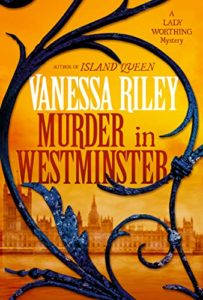 Sometimes all it takes is a small change in point of view to make a huge difference. Vanessa Riley’s lively historical mystery set in 1806 London sets itself apart from the several other Regency historicals out there at the moment, simply by creating a black main character. At the time the black population in London numbered up to 20,000, out of a population of about one million. They were referred to as Blackamoors and included Africans and East and West Indians. (Riley’s notes at the back of the book are invaluable.)
Sometimes all it takes is a small change in point of view to make a huge difference. Vanessa Riley’s lively historical mystery set in 1806 London sets itself apart from the several other Regency historicals out there at the moment, simply by creating a black main character. At the time the black population in London numbered up to 20,000, out of a population of about one million. They were referred to as Blackamoors and included Africans and East and West Indians. (Riley’s notes at the back of the book are invaluable.)
Her main character is Lady Abigail Worthing, a young Blackamoor married to a naval officer. Through her marriage she saved her family from debt, but in the process became estranged from her sister. Her husband is rarely home (not at all in this novel, but I’m thinking he might appear in future installments), so when her neighbor’s wife is discovered murdered in their mutual back yard, she is forced to deal with it alone. She and the neighbor have a prickly relationship, but they give each other a mutual alibi and spend the rest of the novel becoming more comfortable with one another, while solving the crime.
1806 is a very specific year. Abigail is a fierce advocate of abolition (unsurprisingly) but in 1806, black rule in Haiti had temporarily stopped all abolitionist efforts. One thread of the novel finds Abigail attempting to connect with William Wilberforce, a well-known abolitionist, and often failing for one reason or another. I am thinking this thread may also be picked up in future novels. The other recurring thread was Abigail’s search for her sister. I am hoping that one will also be picked up in the future.
Abigail’s personal journey find her mostly occupied with her neighbor’s murder, however, and the investigation takes her further into the woman’s backstory and connections. The investigation is carried out with the help of her well-placed godfather, who helps her with background research; her friend and cousin, Florentina, and the official investigator, Lord Duncan. Because Abigail has helped him in the past on some minor crimes, he is willing to listen to her.
Abigail has a smattering of her mother’s gift of second sight and another smattering of plain old intelligence that allows her to analyze events and evaluate them clearly. In short, she’s a perfect detective. Even though she is a woman of color, she is also a woman of means married to a naval hero, so she can access most places and speak to the people she needs to speak to.
Riley’s storytelling gift is strong and her prose is lovely and evocative. She made me see 1806 London in an entirely new way – I’m a fan of Jane Austen as well as Dianne Freeman and many others – but she gave me the gift of an expanded perspective, along with a really well told mystery. The denouement is particularly clever and includes both grim irony and a dandy twist. I’m hoping this will be a long-lived series and that I can visit with Lady Abigail again soon.